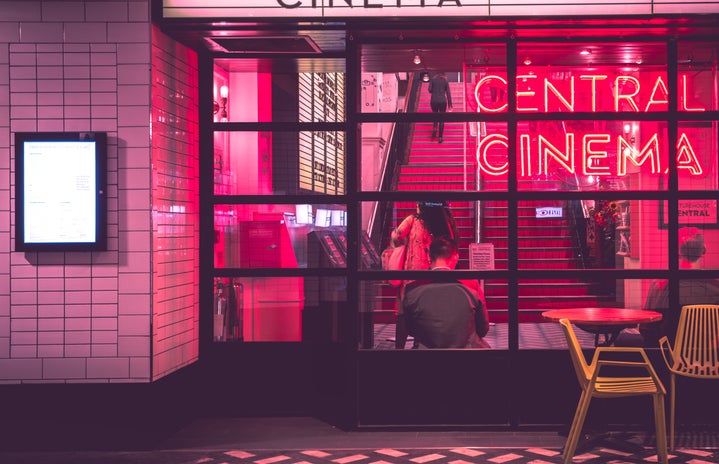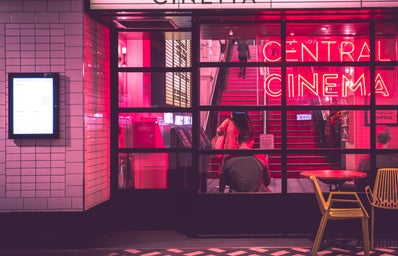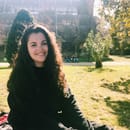Papicha: an Algerian word referring to a pretty woman.
Written and directed by Mounia Meddour, Papicha is a harrowing film about female friendship and resistance in the face of oppression. Set in the ’90s during the Algerian war, the story revolves around Nedjma (Lyna Khoudri), whose rebellious and headstrong demeanor carries the film. She studies at a French language University, where she lives with her two best friends, Wassila (Shirine Boutella) and Samira (Amira Hilda Douaouda). Nedjma dreams of becoming a fashion designer, and sells her creations in nightclub bathrooms. She is rebellious, openly tearing down and defacing posters proclaiming that women must cover up to protect themselves. She and her friends cut deals with various male gatekeepers so they can sneak out of their dorms and do as they please.
We are introduced to Nedjma and Wassila in the back of an ‘illegal taxi’ as they get ready to go to a club. Boombastic, bass heavy music plays as we see the two young women shedding layers of modest clothing to reveal sequined tops. They hand the taxi driver a tape to play as they drive, and the two joke with him while applying lipstick. It’s a scene I commiserate with–going out with your friends, laughing in the back of cab, excited for all of the possibilities the night might bring. As they get closer to their destination, they reach a checkpoint. Nedjma and Wassila quickly cover their hair with various garments and sit still in the backseat. Men dressed in all black with shotguns circle the car, and demand that the driver get out to open the trunk. It’s a moment that immediately immersed me into the context of Nedjma and Wassila’s lives. Luckily, they pass the checkpoint and make it to the club without any problems, and happily continue to go about their night.
Freedom is a central theme in the film, as is hope. At the beginning of the movie, Nedjma and her friends are blind to the true dangers of the war. Their headmistress turns off the news so the girls can’t hear about the violent attacks targeting women who don’t cover themselves. When they go out, the girls deface posters, chain-smoke, and stay out until the sun rises. It is only after a tragedy strikes in Nedjma’s life that she begins to understand just how powerful her freedom of expression and movement truly is.
The male gatekeepers she relies on to help her do what she wants all begin to turn on her. Her fabric salesman tells her she should stop designing clothes, as it’s not a woman’s place. A concrete wall is put up in place of the gate she used to sneak through, forcing her to beg the guard to let her pass. Even her seemingly liberal boyfriend gives her an ultimatum -marry him and he’ll allow her to be free in the West, or stay in Algeria and suffer the consequences. She is never entirely free, relying on men to provide her freedom. This only emphasizes the film’s stance on rebellion – every choice she makes in favour of her own desires is in itself an act of defiance.
Despite the oppressive forces within Algeria, Nedjma has no desire to leave. After all, her friends and family are all in Algeria, and she was born and raised within its borders. Algerian society is painted in both love and pain through moving imagery of the city and of the people Nedjma encounters. It is important to note that this film is not in any way a condemnation of religion itself, but on the extremism born out of it. Crucial is the topic of choice; who chooses how Algerian women live, and how the choice is implemented. The film often feels like a reconciliation with Algeria’s history, weaving heavy plotlines with moments of love and happiness.
The film is at its best when it focuses on these moments, particularly within the friendships between Nedjma and her female friends. They dance in her room while she sews their dresses, singing and joking about their love lives and personal goals. In one of my favourite moments of the film, five of them go to the beach, where they carve up plans for a fashion show and go swimming. It’s such a joyous, triumphant moment; the sun is setting, casting a golden light onto them as they roll around in the sand. It is one of the rare moments where they are completely undisturbed by the war raging in their city. They are at peace, designing their lives with enthusiasm. They yell out into the horizon, “Viva Algeria!”
These moments of happiness are the heartbeat of the film, and work as a reminder to the audience that despite the unbearable darkness of war, there will always be hope. The more Nedjma’s choices are scrutinized and punished, the stronger her hope grows. Why can’t she make her dreams a reality in the place that she calls home, with the people she loves most?
Although there is a lot to love about the film, it does at times begin to feel repetitive, especially in the third act. There are a few moments that feel unnecessary and rushed. A prime example is the fight Nedjma and Wassila get into in the final 45 minutes. Narratively, the fight makes sense, but it only adds to what we as an audience already knows is true of the characters. It felt redundant; a cheap plot point used to further Nedjma’s own internal conflict, which the audience is highly familiar with by this point. The climax of the film comes as no surprise, cushioning the impact slightly. However that’s not to say that the power of the films’ final moments are not felt – the entire theatre was completely silent for the final thirty minutes.
After a particularly disturbing moment in the first half of the film, Nedjma says to Samira, “I wish I could scream, but I can’t.” Instead of screaming, she takes action. Despite every obstacle thrown at her, Nedjma never stops living her life on her own terms. Everytime she succeeds in fulfilling her desires; even if her success is brief, it feels sweet and intensely gratifying. A true story of womanhood and heroism, Papicha is an excellent film about fighting for one’s right to live freely through doing exactly that. It is truly immersive and gripping from start to finish.
Check out the trailer here.



